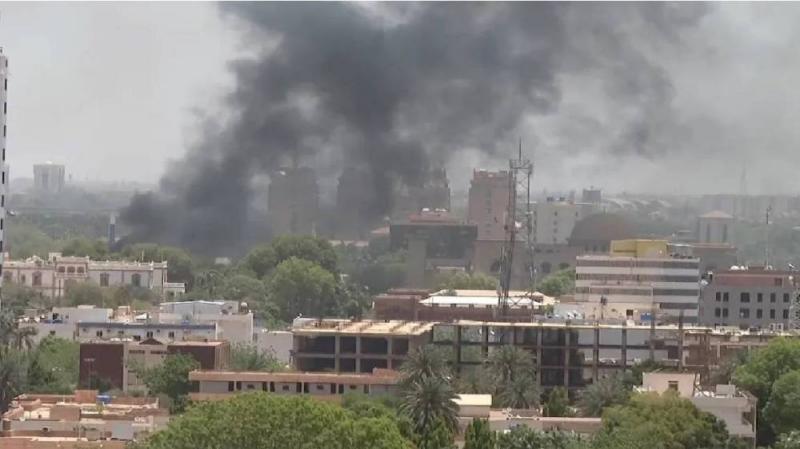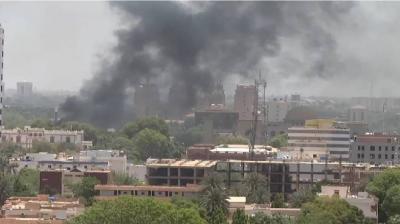Both warring parties in Sudan confirmed on Thursday that they would extend the ceasefire for another 72 hours. However, violence continued in the capital Khartoum and the Darfur region in the west of the country. The Rapid Support Forces reported that "the coup leaders violated the ceasefire by launching an attack on our positions at the Jebel Awliya and Omdurman bases." The United States stated that "ceasefire violations are concerning."
The fighting between the army and the Rapid Support Forces has resulted in hundreds of deaths, thousands of injuries, and tens of thousands fleeing for their lives after two weeks of fighting. Ethiopian Prime Minister Abiy Ahmed discussed the "necessity of amicably resolving differences and achieving stability in Sudan" with the head of the Sudanese military council and leader of the Rapid Support Forces, Mohamed Hamdan Dagalo, known as "Hemedti."
The main hospital in El Geneina, the capital of West Darfur, which is supported by Doctors Without Borders, was looted during a violent raid in the past two days. Sylvan Piron, Deputy Operations Director for Doctors Without Borders in Sudan, stated, "Many people have fallen into the siege of this deadly violence. They are afraid to risk their safety and lives in an attempt to reach the scarce health facilities that are still operational and open."
On another note, the Turkish Ministry of Defense announced that a Turkish evacuation plane was shot at at Wadi Sayyidna Airport in Sudan but reported no injuries. The Sudanese army revealed that "the semi-military Rapid Support Forces fired at a Turkish evacuation plane as it was landing at Wadi Sayyidna Airport outside Khartoum, injuring a crew member and damaging fuel tanks," affirming in a statement that "the aircraft landed safely and is being repaired." The Rapid Support Forces, on their part, claimed that "the allegations from the army's coup leaders about attacking a Turkish evacuation plane are contradicted by the reality on the ground."
Evacuation operations continue amid concerns about renewed fighting after the ceasefire, which both sides have agreed to extend for another 72 hours. The UN mission in Sudan reported that "France evacuated UN staff and international NGOs from the city of El Fasher." The International Organization for Migration indicated that two initial evacuation flights from Sudan to Chad took place, with 226 individuals, including 39 children, arriving in the capital N'Djamena on Thursday. U.S. State Department spokesman Vedant Patel announced that several hundred U.S. citizens have left Sudan by land, sea, and air.
The UN, African Union, Intergovernmental Authority on Development (IGAD), and the so-called Quad countries, which include the U.S., U.K., UAE, and Saudi Arabia, welcomed the extension of the ceasefire. These nations issued a joint statement relayed by the Saudi Press Agency, stating: "We welcome their willingness to engage in dialogue to achieve a permanent cessation of hostilities and ensure unhindered access to humanitarian assistance."
The White House expressed "grave concern regarding violations of the ceasefire. The situation could worsen at any moment, and we urge American citizens to leave within the next 24 to 48 hours." Meanwhile, the army asserts it controls "most areas of Sudan and is confronting significant deployments of the Rapid Support Forces in Khartoum, where some residential areas have turned into war zones." Witnesses noted: "Despite a partial calm since the start of the first 72-hour ceasefire, the sounds of airstrikes and anti-aircraft fire were heard in the capital and in the nearby cities of Omdurman and Bahri."
The fighting has also spread to the Darfur region in the west, where conflict has intensified after two decades since the outbreak of civil war. Humanitarian agencies have largely been unable to distribute food supplies to those in need in the third-largest country in Africa by area, where one-third of its population, totaling 46 million, already depended on humanitarian assistance. Egypt reported receiving 16,000 people, while 20,000 crossed into Chad, and the UN High Commissioner for Refugees indicated that more than 14,000 people had crossed into South Sudan.
Despite global calls for talks, army commander General Abdel Fattah al-Burhan told Al-Hurra TV that it is "unacceptable to sit down with the leader of the Rapid Support Forces, Mohamed Hamdan Dagalo, whom he described as a leader of the rebellion." Dagalo told the BBC that the Rapid Support Forces would not engage in talks until fighting ends, accusing the armed forces of relentlessly bombarding his fighters and holding Burhan responsible for the violence. He added: "Stop the fighting. After that, we can negotiate."




